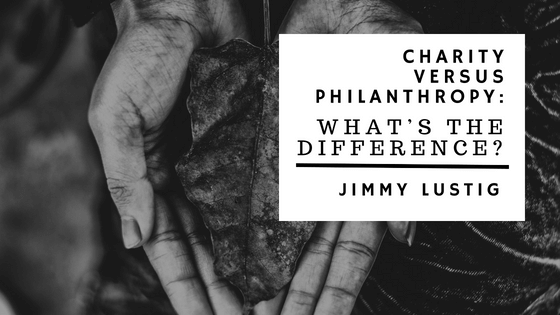Often, the words charity and philanthropy are used interchangeably. Both have to do with giving and helping others, so it’s easy to conflate the meaning of the two words. But, the two words have distinct meanings and deal with different areas of world change. To put it in simple terms, charity is giving, while philanthropy is doing.
Charity is a short-term response focused on relief and rescue. It addresses an immediate need for a community or a cause, such as food, shelter and medical care. Giving a meal or a coat to a homeless person would be charity, not philanthropy. While it’s addressing a need and is necessary, it doesn’t tackle the root issue.
Philanthropy focuses on finding a long-term solution to a problem. Philanthropy aims to solve problems, instead of providing temporary fixes to them. Philanthropy is a more strategic plan of giving that’s built around past success and has a strong focus on the community. While charity often only benefits one or a few people, philanthropy aims to reach a much broader group of people. By tackling the societal roots of these problems, philanthropy seeks to change the world in the long-term.
Another common misconception is that only the rich can be philanthropists. While those with money can tackle larger humanitarian issues, like donating money to build a new hospital wing, everyone can be a philanthropist. Everyone can make changes in small ways with some planning. Speak to the people in your community and learn what their needs are. Then, learn how to use the skills and resources you have to contribute to a solution to those needs.
This is not to say that charity is useless or should be done away with; it solves a purpose and gives us a chance to make small impacts on others. Both charity and philanthropy are necessary, and one isn’t better than the other. Another way to look at it is that philanthropy and charity are two different approaches to solving the same problem. They’re overlapping strategies that both are vital to the nonprofit sector. The two work in tandem with each other and the hope is that the practice of philanthropy eventually eliminates the need for charity.
An example of how the two work together can be seen in dealing with addiction. Philanthropy may fund a study that looks into risk factors of addiction or provides preventative education that works to prevent people from becoming addicts in the first place. These are long-term strategies, and ones that may take years to make any difference in addiction rates. A charitable organization would deal with the right-now of drug addiction, perhaps in the form of starting a detox center, to handle the immediate need.
